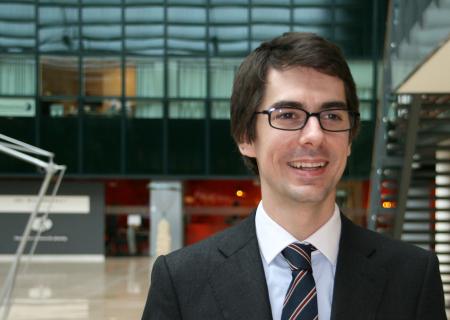Wenzel Hoberg
Managing Director and Head of Real Estate Investments, Canada Pension Plan Investment Board
Wenzel Hoberg was elected to the INREV Management Board in April. His experience of alternative real estate products will be of considerable benefit as INREV moves further into this territory. IQ caught up with him to get his views on investment principles, the state of the real estate investment market and challenges for INREV.
“INREV started out representing LPs who held an interest in non-listed real estate funds as well as GPs. A lot of the research they do is built around these audiences so for many years I ignored the organisation. It was less interesting for me to get involved,” comments Wenzel Hoberg, Managing Director and Head of Real Estate Investments, at Canada Pension Plan Investment Board (CPPIB), with characteristic frankness.
Over time, however, he has come to appreciate the organisation’s contribution to the industry citing in particular the work that INREV has done in terms of promoting transparency and establishing guidelines and standards.
Admitting that he might initially have “underestimated” the usefulness of this work, Wenzel explains how his interest in INREV really came to the fore when he joined the Investor Platform Management Committee. “I started to get more involved.
You could feel that they were adapting and wanting to broaden their appeal focusing on debt funds and expanding across the spectrum of products - such as joint ventures, separate accounts and clubs - and across the globe also. They began to think about infrastructure and while this is interesting I think it’s right that they should stay away from it at the moment,” he says.
Wenzel’s investment activities at CPPIB are very much focused on a broad range of products. It would seem perfectly logical, therefore, that as INREV’s scope has continued to evolve and expand, the organisation should have become more relevant to him and his business.
Move to joint ventures
He explains how CPPIB’s own strategy has also developed over time. Starting initially with a mostly domestic Canadian portfolio with direct holdings through joint ventures (JVs), activity broadened internationally in 2006 through funds. Much of the objective was to learn about different markets such as Asia and to acquire new skills. The appetite to learn was voracious. Wenzel says he did many fund deals in pursuit of knowledge and experience. But he confesses that the journey wasn’t always successful. “Sometimes it’s not been that insightful. The ability to learn from funds is limited. But once we started to have more segregated account deals we began to learn more. We got to see more of the rationale behind the deals.”
According to Wenzel, this experience helped CPPIB to build its direct real estate capabilities and to move from segregated accounts to JVs. It also taught them that the traditional fund structure wasn’t suited to their objectives. As a major institutional pension fund, CPPIB is a very long-term investor with a requirement to find new vehicles through which it can deliver longer-term deals. And a need for greater control, transparency and input into the deals being done – principally tighter management of liquidity and leverage. “In the fund structure there are too many limitations,” says Wenzel. “The capital comes back and we can’t then re-deploy it quickly enough.” Equally important considerations for him are the ability to control the “constant churn of fees and transaction costs” and ensure there is an appropriate level of alignment with fund managers.
INREV speaks with a single voice and therefore has the ability to influence policy,which is vital.
These lessons were what pointed CPPIB toward an investment programme focused on JV-type structures. And Wenzel explains that forming effective JVs relies on working with like-minded partners. In his view this has led to a situation where pension funds and sovereign wealth funds form the bulk of JV partnerships, limiting opportunities for smaller scale players with less financial fire power.
Wenzel suggests the consequence of this situation is an inevitable and inexorable shift in the structure and dynamic of the market. But he believes there remains the need for a solution that can satisfy the requirements of smaller investors. He sees demand for “aggregator” or “specialist” GPs who can bring deals to the table and manage these through. The opportunity, says Wenzel, is for those who can offer a specialist role probably in terms of either market or sector expertise. All investors will continue to value and want to access this type of input. For example, investors considering entering geographic markets such as Scandinavia or emerging sectors such as hotels will always seek specialist advice and support.
“Those that can fulfill this need and who have something to offer will survive but the old model has probably gone forever. There will be a weeding out process and those in the middle will find it tough,” he concludes.
Wenzel adds that pressures are only likely to mount for the smaller, untried, non-specialist firms. “Track record has always been key but it is increasingly important,” he says. In the current economic environment investors are even less likely to work with firms that are not “an approved name, a safe bet”. Finally he observes that the increasing impact of regulation is also unhelpful – that it is simply piling up the barriers to entry for smaller fund managers.
With this thought Wenzel returns to INREV, highlighting public affairs as one of the key areas he feels the organisation should concentrate on. “As the industry body, INREV speaks with a single voice and therefore has the ability to influence policy, which is vital,” he says. This, he believes, is a huge advantage for members because individually they can’t have the same impact.
Sustainable approach
He is also keen to make the point that INREV must maintain its key role as the guardian and chief promoter of principles and standards for the industry. But there is scope to take this into new areas, such as sustainability, which is a big issue for investors.
“At CPPIB, we’re very focused on sustainability. Our ambition is to go from 0 to 100 and to operate at a ‘best in class’ level. But this isn’t the best way to approach it. INREV could establish a standard that isn’t 100% but that starts at maybe 50% or 60% and improves over time. This would help the industry to be more realistic. Otherwise everyone sets out principles that are too high and unachievable,” says Wenzel.
He adds that it would be interesting for INREV to consider expanding its research capabilities and begin to collect data from investors too. Drawing on his extensive firsthand knowledge of JVs, clubs and segregated accounts - not to mention his insights into public markets and private equity - there’s little doubt that, whatever happens, the University of Wisconsin Fulbright Scholar will make an immense contribution to the INREV Management Board.
NOTE: In February 2016, Wenzel Hoberg moved from CPPIB to become CEO of Triuva.








